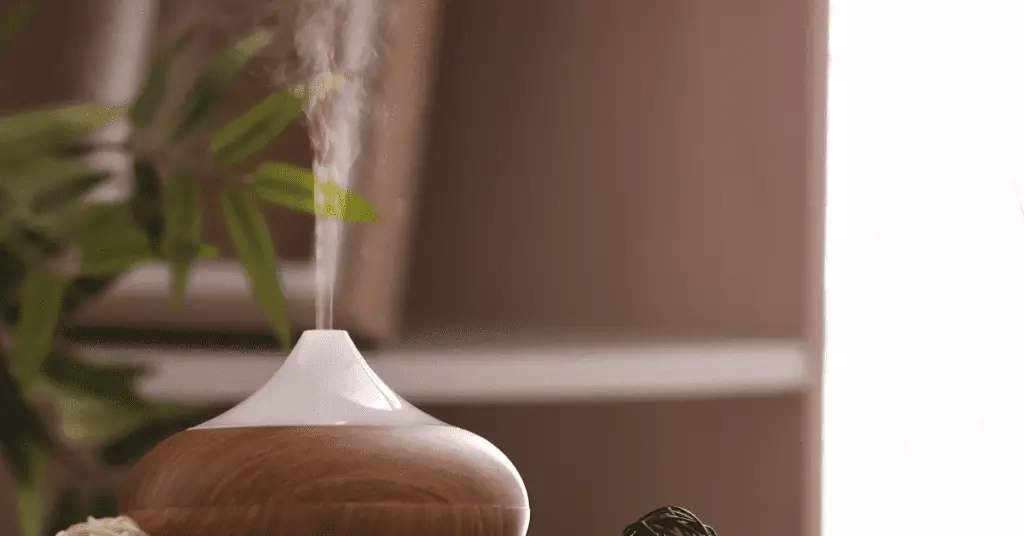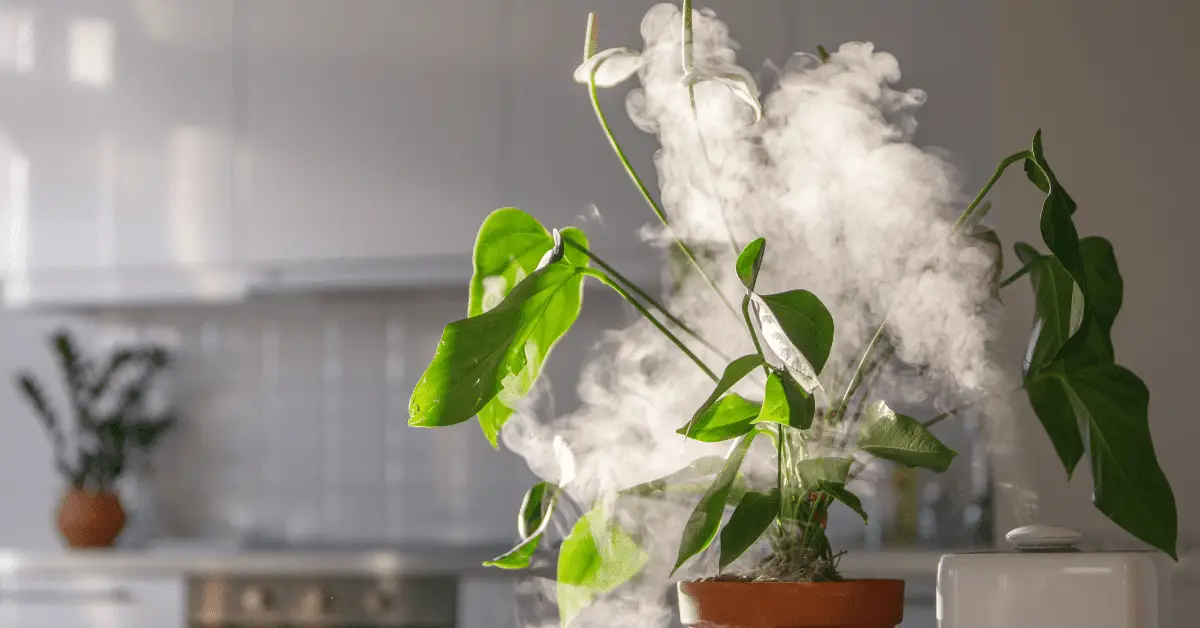Many plant species thrive in humid environments, so they may experience transpiration if the humidity is low, especially when you’re not regularly watering them. While there are many ways to increase moisture in the air, you may want to invest in an air moisturization device if you live in arid climates or experience dry seasons.
You can use a diffuser as a humidifier for plants, especially in small spaces, like a plant corner. Diffusers are like mini-humidifiers, albeit with a different purpose. Due to their compact size, they don’t produce much moisture, so they won’t significantly alter the humidity in spacious rooms.
Diffusers and humidifiers share many similarities and few differences. Read on to learn more about using a diffuser as a plant humidifier.
Is a Humidifier or Diffuser Better for Plants?
Humidifiers and diffusers both perform similar functions, but when it comes to moisturizing the air for plants, the humidifier is the clear winner. Thanks to its high moisture output, it can change humidity levels in a shorter time and over a larger area.
A humidifier is better for adding moisture to large rooms or multiple plants due to its capacity and increased moisture output. They’re more capable of altering the humidity in large spaces. On the other hand, diffusers may be more effective in small areas or placed next to single plants.
Compared to diffusers, humidifiers have significantly bigger water reservoirs, allowing them to run longer. In addition, they put out more moisture, so they’re perfect for large rooms that host a multitude of plants.
On the other hand, diffusers are unlikely to alter the humidity levels in a large area significantly.
With that said, diffusers do have some advantages over humidifiers when it comes to plants.
These machines are compact, so they fit well in small areas, like shelves, and they come in various designs, allowing them to blend in with a room’s decor easily.
In addition, you don’t have to use essential oils—you can run it with plain water, and it acts the same as a mini-ultrasonic humidifier.
Diffuser vs. Humidifier
Humidifiers increase the moisture content of the air.
There are different types of humidifiers, including ultrasonic, evaporative, steam, and impeller. They come in both warm and cool mist types. The ultrasonic humidifier is most similar to a diffuser and uses cool mist.
Most diffusers use ultrasonic technology to stimulate the water and oils, breaking the molecules into a fine, cool mist. Manufacturers market these devices as “essential oil diffusers,” with their primary purpose being aromatherapy.
The increase in humidity is considered an effect of oil diffusion, not the device’s main function. With that said, diffusers may be run on water alone, therefore, acting precisely as a mini-humidifier.
Ideal Humidity Levels for Plants
No two plants are exactly alike, so choosing optimal humidity levels may require a bit of research.
As a general rule of thumb, most mature plants prefer a humidity range between 50 and 60 percent. Depending on the size of the area where you keep your plants, a diffuser may be able to achieve this level of humidity.
On the other hand, tropical plants love moisture and may prefer humidity levels as high as 90 percent. It’s highly unlikely that a diffuser has the capability of altering humidity levels high enough to meet the needs of tropical plants.
Succulents, cacti, and other plants native to arid climates do perfectly well in humidity levels as low as ten percent. You don’t need a diffuser or humidifier to keep these dry air-loving plants happy.
Can You Diffuse Essential Oils Near Plants?
Since diffusers act as mini-humidifiers and have the potential to diffuse beneficial essential oils into the air, you might be wondering if you can diffuse oils near your plants. It’s essentially providing two benefits—the beneficial properties of the oil and additional moisture—but is it safe?
Some essential oils may be safely diffused near plants—and they might even provide some benefits. Citronella, tea tree, and neem oil are great at repelling insects like fruit flies. Cinnamon oil has antifungal properties, preventing the growth of harmful organisms.
Because plant oils are extracted from different parts of a plant, it makes sense that they’re safe to use around plants in small amounts.

Neem oil, in particular, has an active ingredient called “azadirachtin.” When diffusing neem oil near plants, it may prevent bugs from eating the plant.
In addition, it acts as an insect growth regulator or IGR. IGRs can stop the life cycle of insects fairly quickly.
Diffusing essential oils doesn’t put enough of the chemicals into the air to alter or harm houseplants. If you happen to diffuse a bit too much, the plants could potentially counteract the oils since many plants filter the air.
Rest assured that you can safely add moisture to the air while also enjoying the benefits of essential oils in the home.
Precautions To Take When Diffusing Essential Oils
When diffusing essential oils for plants, there are some precautions to consider.
Time Restraints
Manufacturers design humidifiers capable of running for hours on end, whereas diffusers are designed to run in short intervals. The time recommendation is mainly to prevent the degradation of the plastics used in the construction of the diffuser.
If you’re running the device using pure water, however, you can run it as long as you’d like, unless the manufacturer’s instructions say otherwise.
Pet Safety
Another thing to consider is your pets. Some animals are sensitive to essential oils, and for others, they can be toxic.
For example, clove, citrus, peppermint, pennyroyal, and cinnamon are dangerous for dogs and cats. Speak to your veterinarian to discuss essential oils and pets.
Even if you’re diffusing an oil deemed safe, be mindful when diffusing essential oils around animals.
Final Thoughts
When the humidity in your home dips and the humidity-loving plants start to suffer, feel free to reach for your diffuser. While a diffuser won’t adjust the moisture levels in the home by much, it could make enough of a difference to keep your plants thriving. If you’re diffusing oils as well, your plants will also get the benefits of the oils.
Sources
- Sprouts and Stems: How To Create Humidity for Your Houseplants
- Huffington Post: What The Heck Does a Humidifier Do and Why Do I Need One?
- Aurae Aroma: Ultrasonic Oil Diffuser Uses and How They Work
- Honeywell: Humidifier vs. Diffuser – What’s The Difference?
- Texas A&M AgriLife Extension: Using Oils As Pesticides – What Oils Are Good for Pest Control?
- Texas A&M University: A Scent-sitive Subject: Essential Oil Diffusers And Your Cat

